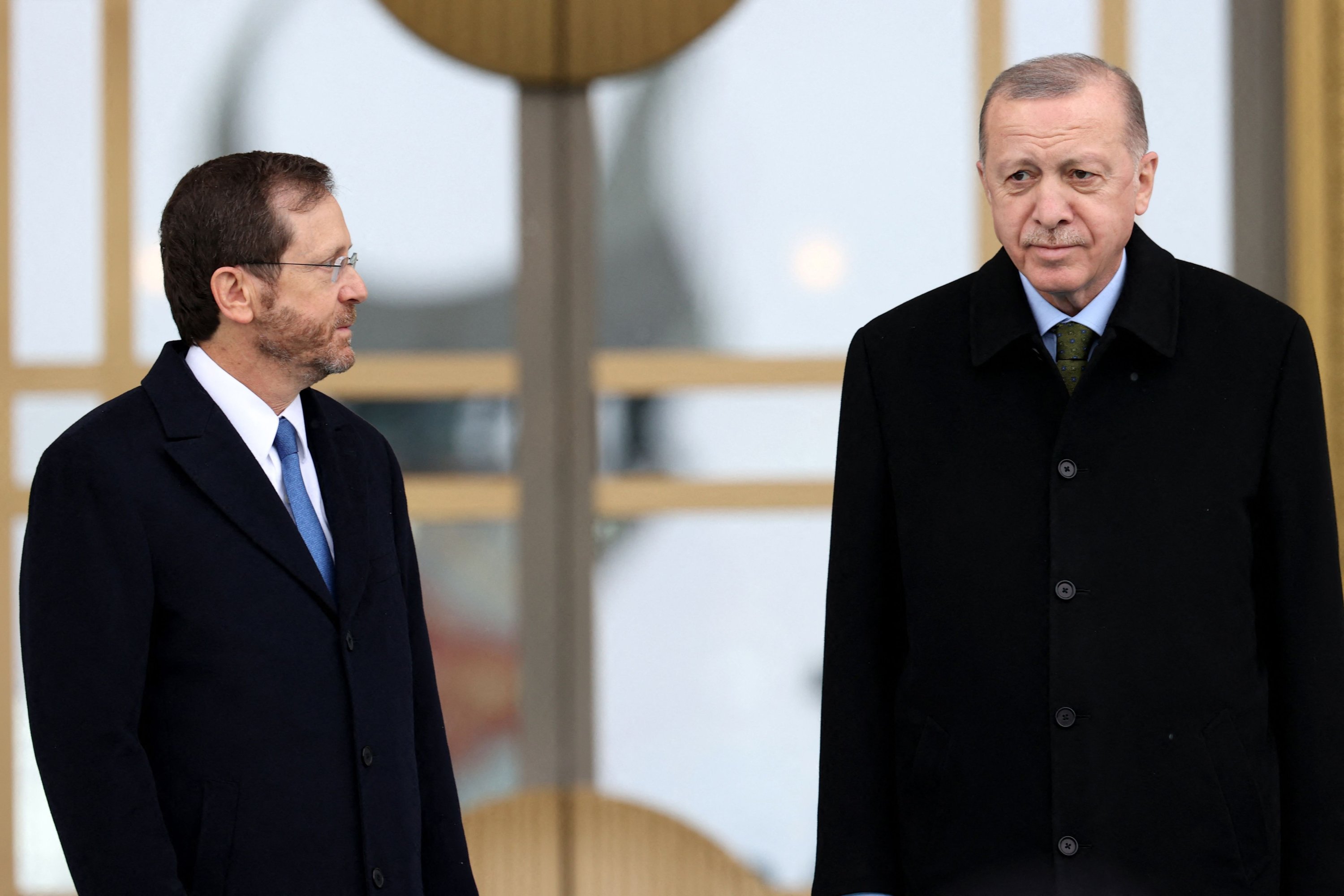© Turkuvaz Haberleşme ve Yayıncılık 2026
Turkey and Israel proclaimed a new era in relations Wednesday after a yearslong rift as the Israeli president made a landmark visit to Ankara.
Appearing before the cameras following talks with Isaac Herzog, Erdoğan described the Israeli president’s visit as “historic” and “a turning point” in Turkish-Israeli relations.
Erdoğan stressed Turkey’s readiness to cooperate with Israel in the energy sector, adding that the Turkish foreign and energy ministers would soon visit Israel for more talks on increased cooperation.
Herzog’s visit marked the first such trip by an Israeli leader in more than a decade, as the two countries have agreed to rebuild their relationship despite their differences.
“I believe this historic visit will be a new turning point in Turkey-Israel relations. Our common goal is to revitalize political dialogue between our countries based on common interests and respect for mutual sensitivities,” Erdoğan said.
“I think this is an opportunity to revive the cooperation on the topic of energy that began before,” he added, referring to the activities of Turkey’s drilling and seismic ships in the Eastern Mediterranean and the Black Sea.
Turkey and Israel had previously attempted to cooperate on energy resources, but those talks had never moved further.
Erdoğan has previously said that the two countries could work together to carry Israeli natural gas to Europe, reviving an idea discussed more than 20 years ago.
Gas supplies from the Mediterranean could ease European dependence on Russian gas, following Russia’s invasion of Ukraine and subsequent calls from European leaders to reduce the continent’s reliance on Moscow.
Plans for a subsea pipeline from the East Mediterranean to Europe, excluding Turkey, stalled after the United States expressed misgivings in January.
Turkey has long opposed the project and has stressed that any scheme, which aims to sideline the rights of Turkey and the Turkish Republic of Northern Cyprus (TRNC) in the Eastern Mediterranean, will be unsuccessful.
The EastMed pipeline had enjoyed the support of the former Trump administration in the U.S. However, in an apparent U-turn, the Biden administration in January expressed misgivings about the project, citing concerns over its economic viability and environmental costs.

Herzog said his visit constitutes a “very important moment” in relations, allowing the countries to “build bridges essential to us all.”
He said: “We must agree in advance that we will not agree on everything, that is the nature of relations with a past as rich as ours.”
“But we shall aspire to solve our disagreements with mutual respect and goodwill, by means of the proper mechanisms and institutions, which we shall develop together, and with our sights together on a common future,” he noted.
Through the years of tensions, Turkey and Israel have maintained trade links. Their goods exchange has been surging over the past five years, with the turnover hitting a record $8.4 billion (TL 124.5 billion) last year, according to official data, up from $6.2 billion in 2020.
Exports to Israel leaped more than 35% year-over-year to $6.4 billion last year, an all-time high, according to the Turkish Statistical Institute (TurkStat). Imports jumped nearly 37% to $2.1 billion.
Israel is among the countries Turkey registers a trade surplus with and has been its ninth biggest export market.
Erdoğan said he hoped trade would reach $10 billion this year.
In a step toward reconciliation, Erdoğan called Herzog via phone after the Israeli head of state took office last year. The visit marks a significant thaw in ties, although Herzog's post is largely ceremonial and any concrete steps toward rapprochement will require the approval of Prime Minister Naftali Bennett.
Erdoğan and his counterpart have held several telephone conversations since then. Erdoğan has also spoken to Bennett in November, the first such call in years
The last visit by an Israeli president to Turkey was in 2007 and the last trip by a prime minister in 2008.
Relations cratered in 2010 as both countries pulled their ambassadors after the deaths of 10 civilians in an Israeli raid on a Turkish flotilla that was trying to break an Israeli blockade of the Gaza Strip to deliver humanitarian aid.
Diplomatic ties hit a low in 2018 when Turkey recalled its ambassador to Israel again following the U.S. decision to relocate its embassy to Jerusalem.
Ankara, which supports a two-state solution to the Israeli-Palestinian conflict, has condemned Israel’s occupation of the West Bank and its policy toward Palestinians, while Israel has called on Turkey to drop support for the Palestinian group Hamas, which runs Gaza.
Despite the rapprochement, Turkey has ruled out abandoning its commitment to supporting Palestinian statehood.
Erdoğan said he raised “the Palestine issue,” and Turkey’s interest in seeing “improvement in the social and political status of Palestinians.”
